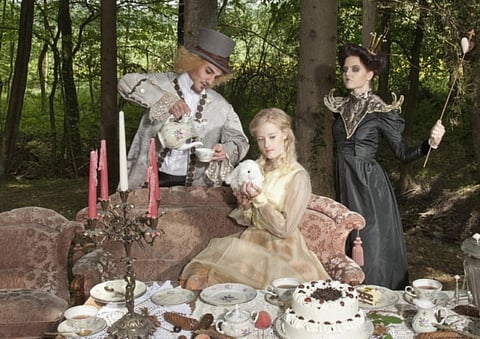Tea, the new coffee
As new teahouses open across the Emirates, it appears the humble brew isn’t just a favourite of the Mad Hatter

What Sarah Jessica Parker did for Manolo Blahnik in Sex and the City is what Central Perk, from Friends, did for coffee. It created a fresh and hip café culture and cafés became the go-to hangout for yuppies through the nineties. What it also did was deal a severe blow to the less flamboyant brew — tea.
Having made a lifestyle choice, just dunking a tea bag into a pot of boiling water is seen as too plebeian and tea drinkers are on the look out for artisanal brands and blends to excite their taste buds.
Mirroring this, speciality tea brands are growing at a much faster pace than speciality coffee. According to World Tea Expo reports, the tea retail market will grow from about 6.6 per cent in 2012 to 8.7 per cent in 2014, reaching $8.3 billion (Dh30.4 billion) in the US alone, the biggest growth the industry has ever seen.
If the numbers are anything to go by, there is definitely a storm brewing in teacups across the world. According to Chicago-based research firm Mintel International, the retail tea category was up 5.1 per cent last year in the US and is set to grow 50 per cent between then and 2016. Reports by retail analysts show a 10 per cent increase in sales of fruit and herbal tea in the UK over the past two years, taking the figure up to £54 million (Dh319 million). Similarly, speciality bags of exotic teas were up 8 per cent to £52 million. But green-tea bags have been the star performer, with a surge of 83 per cent in the past two years alone — rising by £10 million to £22 million.
Regional trends
Always quick to mirror global trends, this year has seen teahouses edge their way into the UAE. Examples are the elegant TWG Tea Salon and Boutique at Dubai Mall, and the bamboo bedecked Artteas in Abu Dhabi, positioning itself as the first teahouse in the region exclusively dedicated to promoting the culture of tea.
“In today’s fast-spinning world, tea emerges as a proven healthy lifestyle alternative to counteract the hectic rhythm of modern times,” says Imma Plana, Manager, Artteas. “This rising awareness about the health benefits of tea have largely contributed to the spread of teahouses and tea salons across the world. Tea is becoming increasingly popular and the UAE is no exception.”
Plana believes there has been a movement to rebrand tea as a healthy and trendy beverage in an effort to break away from the stereotype. Tea accompanies any type of meal at any time of the day and the beverage is finding its way into fine dining too. “Many restaurants offer a tea menu alongside their regular menu to complement and enhance their gastronomic offer and overall dining experience,” she says. Artteas offers variations of white, green, yellow, oolong, red and black teas along with more than 30 different types of fragrant, herbal and blooming teas. Bestsellers include jasmine pearls, a green tea mixed with jasmine flowers hand rolled into beautiful pearls that are fun to watch unfurl.
It is this notion of taking tea from Victorian teahouses into the luxury space that prompted Singapore-based TWG to brew its magic in Dubai. “The Middle East is thirsty for gourmet, luxury tea since customers are more conscious of what they are consuming, and happy to pay more for a quality product,” points out Taha Bouqdib, President of TWG Tea.
TWG Tea’s menu boasts teas from all 36 tea-producing countries around the world. It also presents exclusive blends carefully conceived to reflect the tastes of modern tea lovers. “By blending essences, fruits, flowers, spices and even chocolate and caramel with different varieties of teas, TWG Tea is constantly innovating in order to take the world of tea by surprise. 1837 Black Tea, Singapore Breakfast Tea and Silver Moon Tea are three of our most popular exclusive blends,” says Bouqdib. Customers are attentive to the quality of their leaves and the origin of the tea and are eager to learn more.
What bigger proof can there be of tea being in the reckoning again than café giant Starbucks opening its first all-tea store, Tazo Tea, in Seattle last month. Also last month, Starbucks Corp announced plans to buy Teavana Holdings Inc for $620 million. Teavana has about 300 shopping mall stores that sell loose-leaf, exotic teas. In addition to opening stand-alone Teavana stores in the US and abroad, Starbucks will add tea bars that serve prepared drinks in existing Teavana stores, Starbucks Chief Executive Howard Schultz told Reuters. “We will do for tea what we did for coffee.”
Local presence
“Borrowed from Asian culture and a favourite in the US, Bubbles & Boba brings the experience to Dubai — adding to the city’s trend factor,” says Mir.



